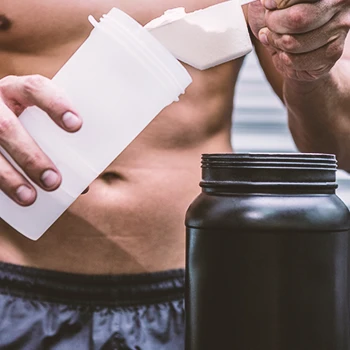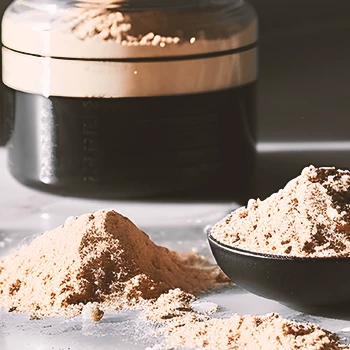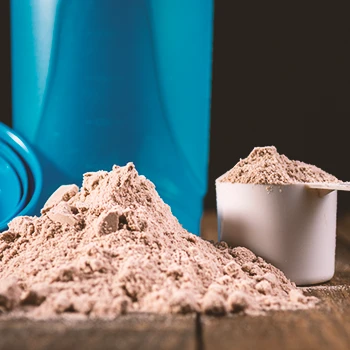As an experienced fitness trainer, I often hear debates in the gym about whey protein versus mass gainers.
These discussions inspired me to write this article, where I'll delve into the differences between these two popular supplements and guide you in choosing the right one based on your training goals.
Additionally, I'll explore whether it's beneficial to use them together, ensuring you make informed decisions to optimize your fitness journey.
But before you decide on that, let me first clarify what they are and what the difference is.
Quick Summary
- Whey protein is more effective in the cutting phase, where the goal is to minimize body fat while mass gainers are better for bulking more than whey protein.
- Pure protein supplements have very little, if any, carbs and fats. Their main goal is to help in the muscle recovery process.
- Studies published by the Journal of Exercise Rehabilitation show that whey protein supplementation is effective for muscle recovery.
- In my professional experience, choosing between whey protein and mass gainers ultimately hinges on your specific fitness goals and dietary preferences.
What Is A Mass Gainer Supplement?

A mass gainer supplement is a sports nutrition powder that aims to provide a large dose of calories in the form of protein, carbs, and fats.
Many bodybuilders struggle with consuming enough calories to effectively bulk up muscles.
In my role as a fitness trainer, I've noticed that this caloric deficit is often the key reason why individuals fail to gain muscle mass, despite their efforts in training and nutrition.
1. Benefits
Mass gainers, also known as weight gainers, pack a ton of macronutrients in each serving. Imagine, one 400 ml shake can slam you with over 400 calories. That's like skipping a bowl of pasta or a few chicken breasts.
2. Timing
There's a lot of head-scratching over when to take mass gainers compared to whey. Here's the deal: they're key after a workout when your body's starving for nutrients. My advice? Knock back a protein shake right after hitting the gym, then chug the mass gainer when you get home. This one-two punch is great for better nutrient uptake and muscle repair.
Recommended post: Tips on how to use mass gainers properly
Why more carbs and less fat? That’s the default macro split for gaining muscle: generally, folks go lower carb for weight loss and higher carb for weight gain. (Of course, there are exceptions, but this is a widely used rule of thumb.)
- Nick English, Health Journalist
What Is Whey Protein?

Whey protein, an isolate of milk, is a staple in my fitness coaching due to its effectiveness in muscle recovery and mass gain. Often hailed as the purest form of protein, these supplements are a common sight in gyms and sports stores
From my experience with clients, its popularity is well-deserved; whey protein not only offers a complete range of essential amino acids but is also easily digestible, making it a go-to choice for athletes and fitness enthusiasts,
For vegetarians, whey protein is a viable option, but vegans may need to look for plant-based, as whey is derived from dairy.
Related post: Whey protein isolate vs. Concentrate
1. Benefits
Whey protein is a game-changer for muscle recovery, as proven by studies in the Journal of Exercise Rehabilitation [1]. As a fitness coach, I've seen clients make huge strides in recovery and performance by adding whey to their post-workout plan. Ever skipped your protein shake and felt sore longer after a workout? That's why it's key.
2. Timing
You may want to take it immediately after you finish training. As your muscles start to relax, they will immediately start the process of repairing micro-tears. For instance, taking whey protein before bed might aid in overnight muscle repair without disrupting sleep.
Some people even try to start taking it during a cool-down phase, as it can take anywhere from 10 to 20 minutes for your stomach to start absorbing the protein.
Difference Between Mass Gainer And Whey Protein

I’ve often heard people say that it’s just down to a different ingredient list. While there is some truth to that, there are quite a few ingredients that will overlap, especially when it comes to protein.
Pure protein supplements usually have very little, if any, carbs and fats. Their aim is to focus on one thing only, and that is to help with the muscle recovery process.
Whey protein has also been shown to work with weight loss, which helps to give you a leaner appearance as your muscles grow.
On the other hand, mass gainers help to supplement the diet with large amounts of calories mainly through protein and carbs. However, you’ll also find some healthy fats as well. If you want to build up some new lean mass in significant amounts, then mass gainer will be more effective.
Can You Take Both?


Recommended protein powders:
FAQs
Does whey protein increase mass?
Yes, whey protein increases muscle mass by providing your body with the essential nutrients called amino acids, as reported by Medical News Today [2]. Amino acids are the building blocks of new muscle tissue, and you will need a lot of them to repair and create new fibers.
Does whey protein make you stronger?
Yes, whey protein makes you stronger by providing the amino acids needed to build up new muscle fibers. As you bulk up, you will notice that you can work out for longer and with increasingly heavy weights. Essentially, the effect is indirect rather than providing you with more energy.
Is mass gainer better than whey protein?
No, mass gainer isn’t better than whey protein as the two supplements provide completely different support for your body. In fact, if you have some significant bulking goals you want to achieve, then you’ll actually need both types of supplements to succeed.
References:
- https://e-jer.org/journal/view.php?number=2013600407
- https://www.medicalnewstoday.com/articles/263371
About The Author
You May Also Like






